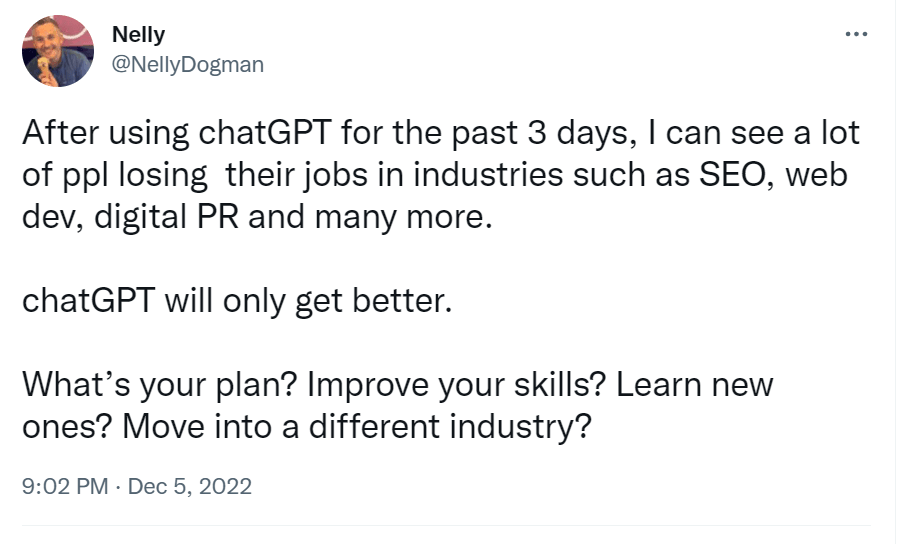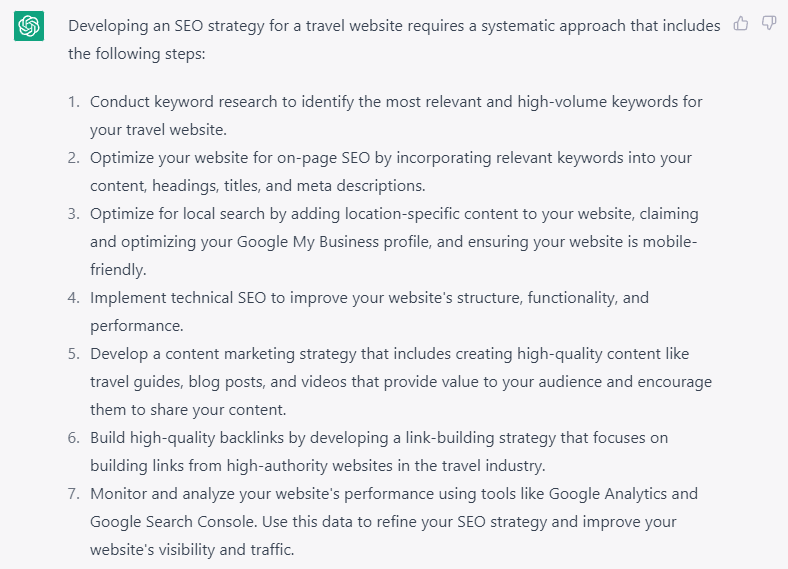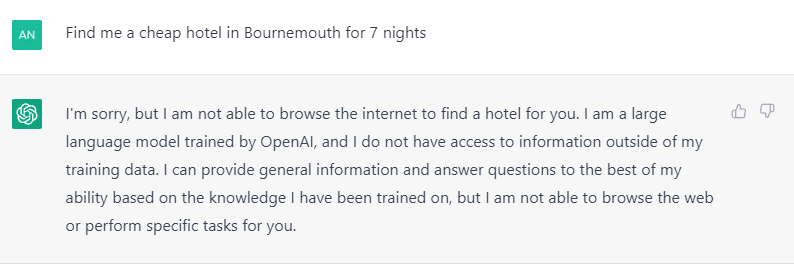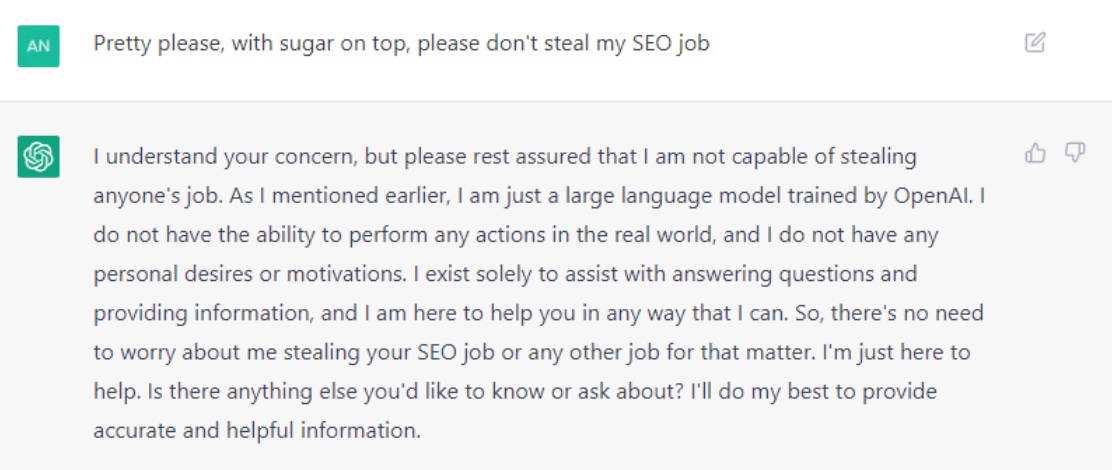Over the last few years, the landscape of search engine optimisation (SEO) has been disrupted by the rise of emerging AI technologies. The latest of these is ChatGPT - an incredibly powerful language processing tool that allows you to have personal, human-like conversations with a chatbot. But what is this tool (described by Elon Musk as ‘scary good’) which is being lauded as a game changer, and could it spell the end for SEO as we know it?
In this article we will take a closer look at the tech world’s shiny new toy and explore just how disruptive it is. Should we believe the hype?
What is ChatGPT
Launched on 30th November 2022, ChatGPT (GPT meaning generative pre-trained transformer) is an AI chatbot prototype capable of engaging in human-like conversations and generating incredibly detailed (but not necessarily 100% accurate) responses to questions and commands. Looking to write an essay on the history of the English Civil War? No problem? Want a poem about Bournemouth written in the style of Shakespeare? You got it. Need to generate some intricate Python code? Easy peasy. Oh, and it’s completely free of charge (for now anyway).
Who made ChatGPT?
ChatGPT was created by OpenAI - the company behind the equally extraordinary AI art generator DALLE•2, along with Whisper, an automatic speech recognition system. The company is keen to point out that this is still a prototype at research preview stage, but given its initial impact (one million sign ups and counting according to one tweeter!), this is already creating big waves across the tech world:

It’s worth noting that ChatGPT certainly isn’t the first AI chatbot to be created. Anyone remember the ill-fated Tay bot from Microsoft which was quietly put to bed after the software was misappropriated by trolls to spread false information? What about Meta’s recent Blenderbot 3 chatbot, which - again - was used for unsavoury activity?
OpenAI have been quick to nip all that in the bud by incorporating Moderation API – an AI-based moderation system that helps developers flag language which goes against OpenAI’s content policy (that said, OpenAI admit themselves that there are still some flaws in this system that will need rectifying before further roll outs).
What makes ChatGPT different from Google?
Ask Google a question and you will get bombarded with information that Google thinks most closely relates to your query and its respective intent - you will be greeted with paid and organic results, featured snippets, videos, image pack, knowledge pack…and that’s just the first page. This wealth of information empowers the user to research information from different sources ranked in accordance with Google’s E-A-T algorithm among many other things.
ChatGPT on the other hand can answer specific, elaborate questions directly, create code, write simple music scores, solve intricate problems, and - this is the jawdropper - hold a full conversation with the end user. Take a look at the example below:

ChatGPT has the ability to carry on a thread of conversation, remembering key details from the initial query as demonstrated in the example above, i.e. that ‘she’ is my mum and that the query is about gift ideas for christmas. Note the informal, friendly tone of the responses, giving the conversation a human touch.
So should SEOs be worried?
There’s no doubt this tool is one of the most disruptive AI technologies to emerge in recent years, and its launch has been met with some worried tweets from SEOs and content writers:

And, from first glance, there is good reason to have some concerns. After all, why should brands spend money on hiring agencies or consultants to develop SEO strategies when, seemingly, they can just get AI to do it for them?

Having played around with the tool at length, I initially shared the concerns of my fellow content writers, but have reached the conclusion that SEOs and content writers don’t necessarily need to dust off their CVs anytime soon. Here’s why:
1. Responses may not be accurate
The responses ChatGPT gives are not always correct. Open AI themselves say the following:
'ChatGPT is not connected to the internet, and it can occasionally produce incorrect answers. It has limited knowledge of world and events after 2021 and may also occasionally produce harmful instructions or biased content.'
The legitimacy and credibility of the sources used to provide responses is somewhat questionable, and apparently not traceable. With no way of fact-checking the source, you are at the mercy of whatever ChatGPT throws out as a response. Indeed, there has already been some criticism of results that ‘look’ correct at first glance rather than actually being completely factual.
On a similar note, the quality of a chatbot’s results are directly linked to the quality of the request. While future models could be developed to ask clarifying questions when an ambiguous query is provided, the current model can at best make a guess at intent.
2. It can only deal with informational intent
While ChatGPT is pretty nifty for the how, where, why type search queries, it currently doesn’t have the capability to deal with more commercially focused queries, nor can it offer product reviews, price comparisons, etc. To prove this point, I typed in ‘find me a cheap hotel in Bournemouth for 7 nights’. The response was as follows:

Not exactly helpful. Yet type the same request into Google and you will see a range of well-optimised hotel websites with prices, reviews, images, etc - all because Google can accommodate all aspects of search intent - not just informational.
3. It cannot answer topical, current questions
Looping back to accuracy, the chatbot in its current form cannot provide topical responses which rely on information or data beyond 2021. This can cause a number of issues, not least any business wishing to write an article relating to current or recent events. This is likely to be a temporary glitch that will be rectified once the tech progresses to incorporate a reliable internet data source.
4. It is likely to lead to duplicated content
If there’s one thing Google hates, then that’s duplicated content. If the recent Helpful Content Update taught us anything, it’s that the slightest whiff of duplication can lead to Google coming down on your site like a ton of bricks, meaning your content is unlikely to rank well. Subsequently, if we are all using the same tool to ask the same questions, getting the same response each time, then eventually the internet will be clogged up with very samey, very run of the mill content, and Google - along with its end users - will not be happy bunnies.
5. It cannot replicate the nuances of human-generated content
We’ve talked about what Google hates, but what Google loves is unique, knowledgeable, relevant content. Yes, ChatGPT is streets ahead of other AI when it comes to replicating human tone, however it simply cannot compete with the creativity, nuances and originality of human-created content. Humans can fact check, use any number of sources at their disposal, bring humour and imagination and strike the right branding tone to match the target audience.
So rather than a threat, could this actually be the start of a beautiful friendship?
The announcement of any new AI technology is always likely to send ripples of concern among the SEO community but the golden rule is this: nothing, and I repeat, nothing can compete with high quality, original content written by humans. AI tools like this have the ability to disrupt SEO, but in a positive way; they'll encourage SEO professionals to strive for a higher standard of expertise and output. And rather than being a threat, it may actually enhance and augment the work of SEO professionals rather than actually replace them, providing useful insights and valuable data which aid optimisation strategies. But don’t take my word for it - hear it from the horse’s mouth instead:

Looking for humans rather than robots to help with your SEO strategy?
If you’re looking for high quality, well-optimised content written by actual humans, the Adido team of SEO specialists in Bournemouth are ready to help drive more organic traffic to your site and maximise lead generation opportunities. Why not get in touch with us today to see how we can help? Drop us a line today!




